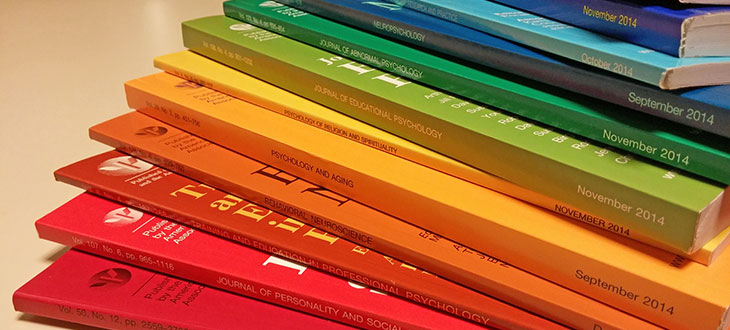Often, the life of an undergraduate research paper ends after it has been graded and relegated to a forgotten Word document. At McGill, however, undergraduate students can have their best papers published by one of dozens of scholarly journals that are completely authored, edited, and published by undergraduate students.
Of the 29 departmental associations under McGill’s Faculty of Arts, 18* responded to an email from The McGill Tribune stating that they have an undergraduate research journal. For most of these publications, submissions go through an extensive selection, peer review, and editing processes before they are published.
The process of running a journal can be daunting as the publication process is complex and it is somewhat uncommon for undergraduates to have their work published. However, the McGill Library staff is committed to assisting undergraduates with research publication. Jessica Lange, scholarly communications and repository librarian, has worked at the McGill Library since 2009 and has seen a significant shift in the undergraduate research journal landscape.
“In around 2012, there was noticeably growing interest in undergraduate research,” Lange said. “It is not just graduate students and faculty that are interested in conducting research, so we began running workshops for undergraduates interested in research.”
Sandy Hervieux, McGill’s liaison librarian for Political Science, Philosophy, and Religion, assists with the McGill Journal of Political Studies’s publication process.
“Working with students writing papers for a course is very different from working with students publishing research journals,” Hervieux said. “In courses, it is about teaching students how to effectively do research and evaluate information. With editorial boards, it is more about the process of how a journal comes together and how to evaluate all of the different submissions that the editorial boards get.”
Lange agreed, emphasizing the significance of undergraduate research in broader scholarship.
“It’s important for editorial boards to understand their connection to the greater scholarly ecosystem,” Lange said. “We see our role as not only helping these editorial boards understand the process but also providing a continuity that journals have a difficult time maintaining when there is a new set of editors every fall.”
Michael David Miller, McGill’s associate librarian and liaison librarian for French Literature, Economics, and 2SLGBTQIA+ Studies, believes that the library has an important role in helping student-run editorial boards and authors understand the legal implications of publishing.
“At the beginning, none of the journals had copyright agreements,” Miller said. “Sometimes, seasoned politicians don’t want their undergraduate work to be published for all to see, so understanding the implications of putting things online is very important. Students have to be as good [at understanding the legal implications of online publication] as professional journalists because it’s being broadcast to the entire globe.”
Miller still stressed the value of getting published as an undergraduate.
“A lot of students that decide that they want to be published in an undergraduate journal will probably end up going on to graduate school, so they get a taste of what a master’s or PhD program might be like, because it’s going to require extensive research and disseminating their ideas,” Miller said. “At the undergraduate level, the stakes are lower and they are finding their academic voice. This makes them more comfortable in a master’s program.”
Although publishing a journal requires significant effort, McGill students should not shy away from the challenge. With so many undergraduate research journals, each writer and editor’s journey will be gratifying in a different way.
One such journal is the International Development Studies Students’ Association (IDSSA) journal Chrysalis. Although the journal is associated with the aforementioned students’ association, there is no stipulation on what department the papers must be written for, and the publication receives submissions across all departments, from Management to Islamic Studies.
Robin Vochelet, U4 Arts, started working with Chrysalis in his second year when he was looking to become more involved on campus and saw a posting for Chrysalis editors.
After a last minute application and two years as an editor, Vochlet now leads the Chrysalis team as editor-in-chief.
“There are not a lot of editors, so the experience is very homey,” Vochelet said. “I love being the editor-in-chief because we receive all these papers on so many different topics that I wouldn’t necessarily stumble upon in my classes.”
According to Vochelet, International Development Studies is one of the most highly-enrolled programs in the Faculty of Arts. In order to be considered by Chrysalis, papers must have received a grade of at least an A- and be written for a 300-level class or above.
“I had a paper published in the McGill Journal of Economics, so I’ve been a writer, an editor, and now the editor-in chief,” Vochelet said. “Whereas most students focus on research in graduate school, I love that undergraduates at McGill can build a passion for a topic through research. This often helps students narrow their academic interests and encourages students to continue their studies.”
Vochelet encourages all students who have written a paper fulfilling the criteria to submit to the publication and says that fear of rejection should not be a barrier.
“As lenient as your professors or teaching assistants might be, there is a reason you got that high grade,” Vochelet said. “At the end of the day, you miss 100 per cent of the shots you don’t take. Even though it sounds cheesy, it’s always true, and it could lead to something great.”
Ruru Hogan, U1 Arts, became the editor-in-chief of the African Studies Students’ Association (ASSA) undergraduate journal during her second year at McGill. As an Anthropology and International Development double major with a minor in African Studies, Hogan has been able to examine African Studies from a variety of lenses. She loves that through the program she has been able to study Africa outside the focus of development.
Unlike some of the more established undergraduate journals on campus, Uhuru is only three years old. In addition, while most other journals are affiliated with a departmental student group, African Studies is not a department at McGill. Rather, it is considered a program under the jurisdiction of Islamic Studies.
“Professor Khalid Medani has been at the forefront of ASSA’s growth and pushed for it to have a journal,” Hogan said. “We have been learning a lot about the process of publishing a journal as we go.”
Uhuru’s only criteria is that academic papers receive a grade of B+ or above. The journal accepts any essay, piece of literature, short story, or poem related to African or African American Studies.
“Papers do not have to be written for an ‘AFRI’ course,” Hogan said. “Being in a very small program is both a blessing and the curse. The community is intimate enough that we are able to reach out to students in the program whom we know and ask them to submit. However, one of the biggest struggles we have faced is publicizing our journal and encouraging people to submit their work.”
Growing a young publication and spreading awareness of its existence are difficult, but Hogan has nevertheless found the experience extremely rewarding.
“I love that being part of the journal allows me to be both academic and creative, and I love that being on the Uhuru editorial board has brought me into this very tight knit community,” Hogan said.
*The undergraduate research journals affiliated with Arts undergraduate associations are: Branches (Environment), Canadian Content (Canadian Studies), Canons (Religion), Cannon (Art History and Communications), The Channel (English), Chrysalis (International Development), Fieldnotes (Geography), Field|Terrains (Anthropology), Fragments (Philosophy), Hirundo (Classics), Historical Discourses (History), JournalLing (Linguistics), Maktoub (Middle East), McGill Journal of Economics (Economics), McGill Journal of Political Studies (Political Studies), McGill Journal of Undergraduate Mathematics (Mathematics), PSI Journal (Psychology), and Uhuru (African Studies).









